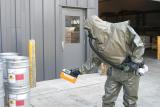Radiation and Shipping Port Security
Radiation Facts
Cargo comes into the United States from all over the world. Shipping ports ensure safety by:
- Screening cargo for radiation before it arrives in the United States.
- Safely handling any radioactive material that needs to pass through a port.
Every day, the United States accepts shipments from all over the world. Multiple agencies work to make sure that all shipments are free from radioactive material or, if they contain radioactive material, that it has been shipped and handled safely.
About Radiation and Shipping Port Security
Cargo comes into the United States from all over the world. This cargo sometimes contains hazardous materials such as chemicals or radioactive materials. American shipping ports make sure that the transport of hazardous material is done safely and securely. Port security also blocks radioactive material from illegally entering the United States.
Cargo containers are checked for radioactive material that could pose a threat to national security or public safety. Security measures include:
- Enforcing licensing requirements for the import and export of radioactive material.
- Prescreening all cargo.
- Inspecting potentially threatening shipments with radiation detectors.
The U.S. Customs and Border Protection (CBP) agency monitors, regulates, and facilitates the flow of goods into the United States. The CBP monitors cargo using different types of monitors, such as radiation portal monitors that scan cargo from the outside and hand-held monitors that can be brought into shipping containers.
Additionally, the Office of Nuclear Smuggling Detection and Deterrence (NSDD) within the National Nuclear Security Administration (NNSA) helps the United States and other countries ensure that radioactive and nuclear shipments are legal and secure. Learn more about this program on the NNSA’s website.
Several different types of radiation detectors are used by shipping port security officials. Examples include:
- Radiation portal monitors: Drive-through monitoring stations that scan vehicles and their cargo. Portal monitors can detect radiation hidden inside shipping containers.
- Personal radiation detectors: Small, highly sensitive devices that sound an alarm when radiation is detected. Many federal officers and agents use these at ports and highway checkpoints in the United States.
- Radiation isotope identifiers: Hand-held instruments that identify specific radionuclides, including nuclear weapon, medical and industrial radioactive materials. Security officers use these devices to identify the type of radionuclide that triggered an alarm.
- Large-scale gamma ray/x-ray imaging systems: These systems use radiation to show images of the contents of cargo containers, rail cars, vehicles or trailer trucks.
What You Can Do
- Respect safety zones. If radionuclides are found unexpectedly at a shipping port, safety officials may set up a safety zone around the port. These zones limit access to protect public health from potentially hazardous materials.
- Obey safety instructions. In the rare case that you encounter this situation, it's important to follow posted guidance and perimeter warnings.

